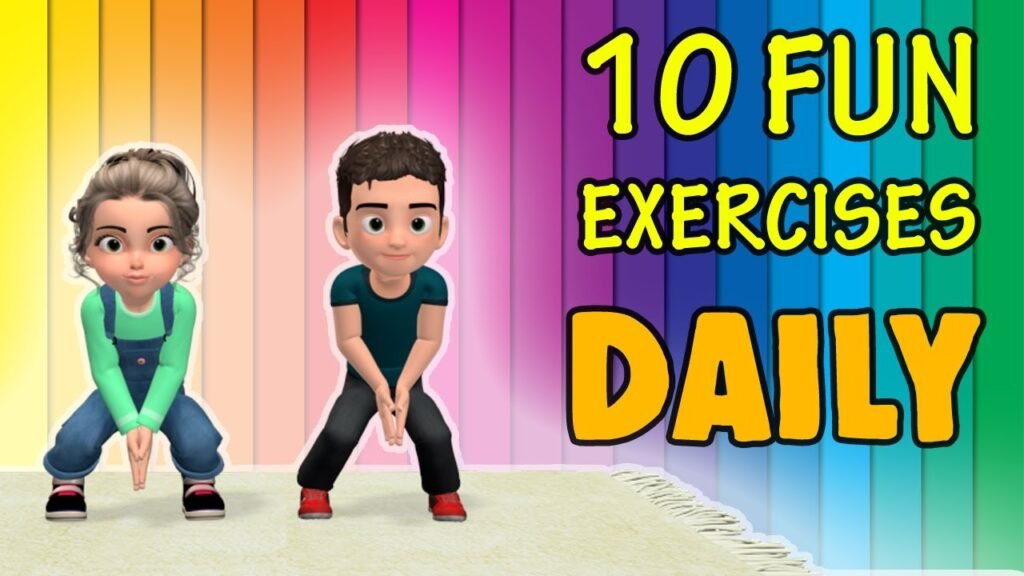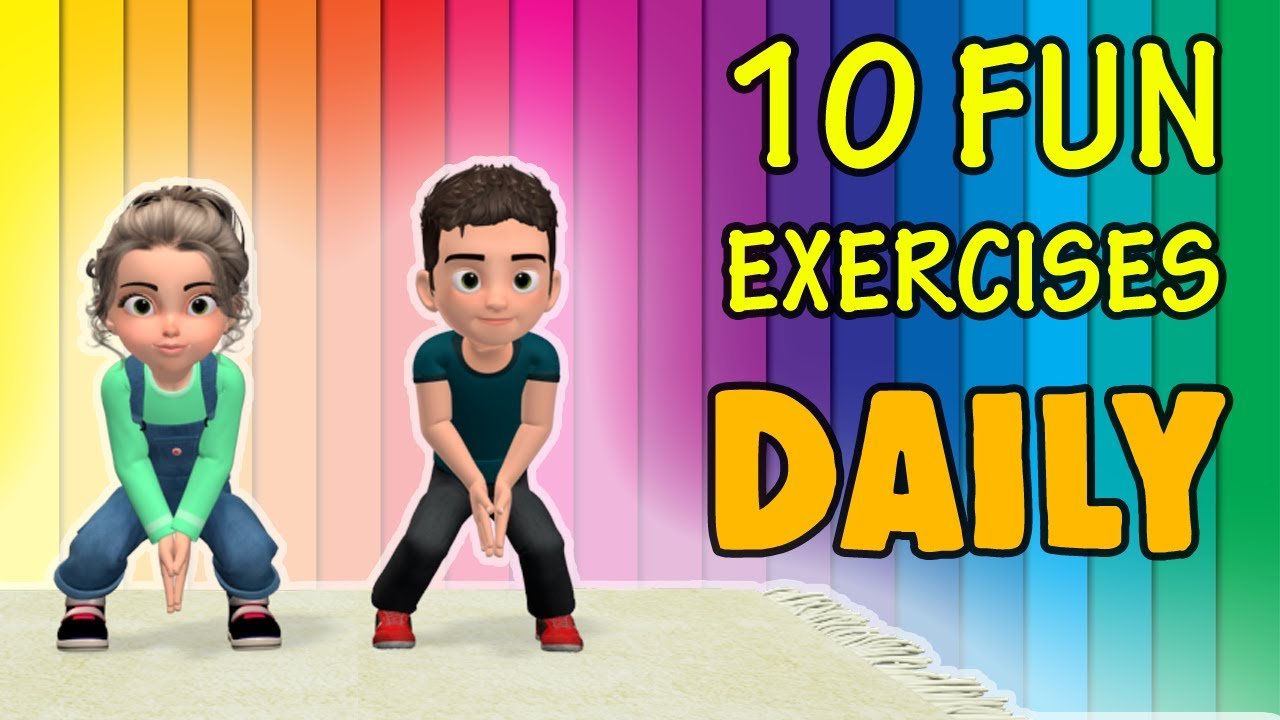Staying active at home can be a fun adventure for kids, and you can easily make exercise an enjoyable part of your daily routine. This article shares ten exciting exercises that can be done right in your living room, helping little ones stay fit while having a blast. Each exercise is designed to be engaging and packed with energy, encouraging kids to move, jump, and laugh as they work up a sweat.
From high-stepping marches to exhilarating jumping jacks, there’s something for every child to enjoy. Not only will these exercises boost physical health, but they’ll also inspire creativity and playfulness. So, get ready to turn your home into a mini fitness studio where everyone can have fun while staying active!

Introduction to Daily Exercises
Staying active is incredibly important for kids, especially when they are at home for extended periods. With school schedules disrupted and outdoor play potentially limited, engaging in daily exercises not only helps keep children physically fit but also contributes to their emotional well-being. In this article, you will discover ten fun exercise routines perfect for kids to do at home while embracing a friendly and encouraging tone.
Importance of Physical Activity for Kids
Physical activity is vital for children’s development. Regular exercise helps boost their mood, improve concentration, and enhance overall health. Engaging in physical fitness during childhood can lead to lifelong habits that promote a healthy lifestyle. Furthermore, activity helps combat childhood obesity, develops strong bones and muscles, and improves cardiovascular fitness. When you encourage your kids to move their bodies, you are setting them up for a healthier future.
Benefits of Exercising at Home
Exercising at home offers flexibility and convenience. You can create an environment where kids feel comfortable and safe while being active. home workouts can easily fit into family routines, and you can lower the barriers to participation since you won’t have to travel to a gym or sports facility. Additionally, exercising at home allows for creativity—you can make it a game, use household items as fitness tools, or involve the whole family for even more fun!
How to Create a Fun Exercise Routine
Creating a fun exercise routine for your kids revolves around their preferences. Start by establishing a daily schedule, and include a variety of exercises to keep things interesting. Make it interactive by turning exercises into games or challenges. You might also add a musical element to get everyone excited. Remember, the goal is to make movement enjoyable, so let your kids pick some of their favorite activities!
Jumping Jacks
How to Perform Jumping Jacks
Jumping jacks are a classic exercise that gets the heart pumping and helps improve coordination. To perform a jumping jack, stand upright with your feet together and arms at your side. Jump while spreading your legs shoulder-width apart and raising your arms overhead. Jump back to the starting position. Repeat this motion for a set amount of time or repetitions.
Variations for Different Skill Levels
If your kids are just starting, they can try half jumping jacks by only stepping out to the sides without jumping. For advanced kids, consider adding speed or increasing the number of repetitions. Another fun variation is to add different arm movements—like reaching up high or diagonal arm swings—to keep things exciting!
Benefits of Jumping Jacks
Jumping jacks are great for cardiovascular health, helping to strengthen the heart and lungs. They also improve coordination and develop muscles in the legs, arms, and core. Your kids will love how simple and effective this exercise is, and it’s a fantastic way to get started on their fitness journey!
Running Man
Instructions for the Running Man Exercise
The running man is an energetic exercise that mimics running in place. To perform it, stand with your feet hip-width apart. Begin by lifting your knees alternately toward your chest while pumping your arms like you are running. Maintain a quick pace to keep your heart rate up.
Creative Modifications for All Ages
To make it more appealing, challenge your kids to race each other or add fun music to keep them motivated. You can also set up a mini obstacle course in your home where they have to navigate while doing the running man, making it both fun and challenging!
Cardiovascular Benefits of this Workout
The running man exercise helps improve cardiovascular endurance and helps burn calories effectively. By getting those legs moving, your kids will increase their heart rate and contribute to overall fitness, which is especially important in developing healthy habits early on.
Ski Hops
Step-by-Step Guide to Ski Hops
Ski hops are a fun, dynamic exercise that simulates the movement of skiing. To perform a ski hop, stand with your feet together. Bend slightly at the knees and jump side to side, landing lightly on your toes. Make sure to use your arms for balance as you hop.
Safety Tips for Indoor Exercise
While doing ski hops at home, make sure there’s enough space free of obstacles to avoid any accidents. Use non-slip mats if possible, and remind your kids to land softly to protect their knees. It’s also a good idea to have them warm up beforehand to prevent injuries.
Muscle Groups Targeted by Ski Hops
Ski hops work primarily on the legs, particularly the quadriceps, hamstrings, and calves. They also engage the core for stability and balance. This multi-muscle activation makes ski hops an excellent addition to any home workout routine.
Reach and Squat
Performing Reach and Squat Correctly
To perform the reach and squat, start by standing with your feet hip-width apart. Reach your arms overhead as you squat down, ensuring your back stays straight, and your knees don’t go over your toes. Stand back up while lowering your arms, repeating for a set number of reps.
Engaging Kids with Fun Themes
To make this exercise engaging, turn it into a game by pretending to reach for imaginary stars or treasure in the sky. Kids can even shout out what they’re reaching for during each squat to make it more interactive!
Benefits for Flexibility and Strength
This exercise helps improve flexibility in the back and hips, while also strengthening the legs and core. Engaging in reach and squat regularly can help enhance overall body mechanics, making it easier for your kids to enjoy other physical activities.
Windmill Exercise
How to Execute the Windmill
The windmill exercise is a fun way to improve coordination and flexibility. Stand with feet wide apart and arms extended out to the sides. Keep one arm up while you bend to the side and touch the opposite foot with the other hand. Switch sides and repeat.
Encouraging Kids to Try Different Dips
Kids can experiment with variations, such as twisting their torso further or bending their knees slightly. You can even encourage them to imitate different animals while performing the windmill to add a playful touch!
Core Strength Benefits of Windmills
Windmills engage the core and improve balance and coordination. Regularly practicing this exercise enhances core stability, which is vital for overall athletic performance and daily activities.
Scissor Kicks
Detailed Instructions for Scissor Kicks
To perform scissor kicks, lie flat on your back with your hands under your hips for support. Lift your legs off the ground about six inches and alternate kicking them in a scissor-like motion. Keep your movements controlled and steady.
Incorporating Music to Boost Enthusiasm
Playing music while doing scissor kicks can turn this core workout into a fun dance exercise! Suggest a song that your kids enjoy and see if they can move their legs to the beat while maintaining form.
Effectiveness for Lower Abdominal Strength
Scissor kicks work the lower abs significantly, helping to build core strength and improve stability. This exercise is also excellent for developing control and can support overall performance in sports and activities.
Swing Backs
Explaining the Swing Back Technique
Stand with feet hip-width apart; lean forward slightly and swing one leg back while maintaining a straight posture. Alternate legs with each swing, and remind your kids to keep their core engaged throughout the motion.
Playful Variations for Excitement
Add some creativity by pretending to be animals that swing their tails, or even play a game where kids have to swing their legs back and touch an object. This makes the exercise more enjoyable while still providing a physical challenge.
The Role of Swing Backs in Overall Fitness
Swing backs help improve flexibility in the hips and strengthen the glutes and hamstrings. This exercise is an excellent addition to a balanced workout routine focused on full-body fitness.
Side Deep Squats
Performing Side Deep Squats Safely
To execute a side deep squat, stand with your feet wide apart. Shift your weight to one side while bending that knee deeply and keeping the opposite leg straight. Hold the position briefly, then switch sides.
Games Incorporating Squats to Keep Kids Engaged
Incorporate games like “Simon Says” or racing your kids to the next spot while performing side squats! This can turn an ordinary workout into an entertaining challenge, sparking more interest in exercising.
Benefits for Leg Strength and Stability
Side deep squats work the inner and outer thighs, improving stability and strength. This exercise creates a solid foundation for other activities and helps develop agility, making it perfect for young athletes.
Conclusion
Recap of the Benefits of Daily Exercise
Daily exercises are crucial for the development and well-being of kids. Keeping them active helps build strength, improves mood, boosts cardiovascular health, and instills the values of health and wellness from an early age.
Encouraging a Lifelong Love for Fitness
By establishing a fun and engaging routine at home, you set the stage for your children to develop a positive relationship with fitness. It’s about fostering enjoyable experiences together, which helps them make activity a lifelong habit.
Final Thoughts on Family Activities Together
Remember, the most important element is to have fun! Involving your kids in fitness creates not just healthy routines but precious memories. So, gear up, have fun, and enjoy moving together as a family!

